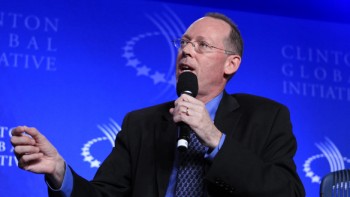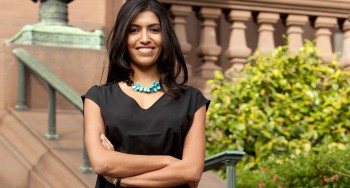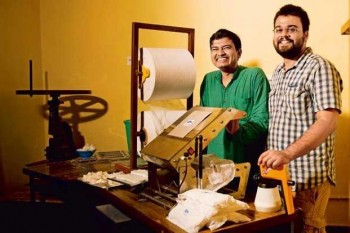by Dennis R. Shaughnessy
My students often ask me for a specific and exact definition of a social entrepreneur. Just one definition, that’s clear and concise and definitive. It’s not so easy to answer that question, given the many definitions offered by a diverse group of people. It’s surely an interdisciplinary question, one that involves not only business but the social sciences, medicine and more.
I have always looked first to business for my definition of social entrepreneurship. Not because I think business is better or more suited for the job, but because I think it has the most untapped potential to solve the world’s biggest and most difficult problems. While governments and charities do great work every day, on the ground, it’s business that creates the world’s wealth and its business that should play a greater role in how that wealth is shared.
So in search of a good definition of social entrepreneurship, a student (Emily Chaisson) after class one day led me back to Dr. Paul Farmer. Here are the words of Dr. Farmer, a founder of Partners in Health, on the definition of a social entrepreneur.
“Having had the chance to connect with others similarly diagnosed, I think I get it now. Social entrepreneurship means many things, and those diagnosed do many things. But all of us carrying the diagnosis of social entrepreneur display certain symptoms that suggest not only the diagnosis, but also, a danger of infection. Indeed, we may soon see a global pandemic of social entrepreneurship.
Here are some of the classic symptoms of the disease: refusal to accept the world the way it is and the direction in which we’re going. An unwillingness to say, no, this can’t be done. Persistence. A certain amount of righteous anger about the injustices done unto others, especially the poor and marginalized, and a willingness to fight back against unjust systems.
And also hope. Blood tests I’ve done on social entrepreneurs, clandestinely, of course, and while the patients slept, show that all have alarmingly high serum levels of hope.”

Dr. Farmer wasn’t sure if he fit the definition of a social entrepreneur that he had read or heard from others. Thus, he offered his own definition.
For those of you who are former students of ours, you know I think of Dr. Farmer as a towering figure in not just public health and medicine, but social enterprise. He’s long overdue for a Nobel Prize for his work. One of our current student leaders here at SEI, Alex Vipond, sent me a note the other day—“Just saw Paul Farmer walking down Huntingdon Avenue, and had to stop and tell him how much he’s meant to (our program)….” Many of my freshmen remember reading “Mountains Beyond Mountains” and having their eyes opened for the first time to what one passionate and committed person can do to change the world for people who deserve better.
So armed with Dr. Farmer’s definition of a social entrepreneur, and with a business perspective, I can answer the questions from students with a clear and precise reply. Social entrepreneurs are persistent people angered by injustice and inequity and outraged by exploitation of the poor and the vulnerable. Most of all, they are ordinary people ready to do something about it channeling their passion and commitment into an innovative, efficient and sustainable enterprise solution.
I also agree with Dr. Farmer’s diagnosis that social entrepreneurship is infectious. We hope to play a small part in preparing young people for the infection. We’re especially excited about helping students recognize and understand the promise and possibility of the global business sector as a platform for both social innovation and social enterprise.

We’re so impressed by young social entrepreneurs like Leila Janah, for the founder of Samasource and its micro-work initiatives to employ the chronically unemployed with outsourced web-based work serving large corporations like Google, Facebook and Amazon. NU senior Ali Matalon has taken what Ms. Janah has taught to Kingston, Jamaica to help unemployed youth find work and the dignity that goes along with it. A team of NU and TSiBA students are now working to create a micro-work project in the townships of South Africa.

Similarly, Sombodhi Ghosh and Jaydeep Mandal of Aakar Innovations are young social entrepreneurs who have worked passionately to empower Indian women through the creation and development of mini-factories for the production of feminine hygiene products for very poor women and girls. Gail Batutis, Maya Carlson, Madison Uva and Camille Carlton are all students who have all worked with Aakar in India to help advance their business and increase their impact.
The infection that is social entrepreneurship is catching on in the business community. It’s one that we don’t want to see a Gates Foundation vaccine for anytime soon!


